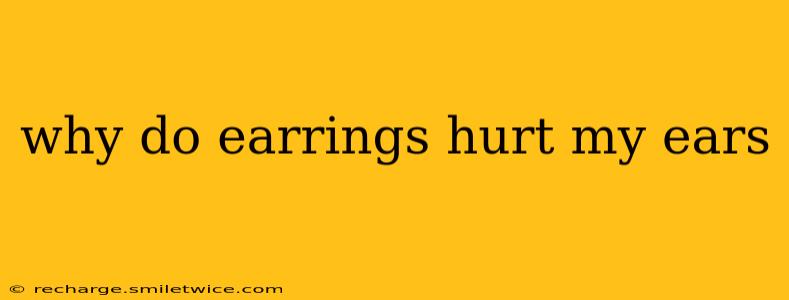Why Do Earrings Hurt My Ears? A Comprehensive Guide to Ear Piercing Pain
Earring pain is a common complaint, especially after a new piercing. However, pain can also occur in established piercings. Understanding the causes can help you manage discomfort and prevent future problems. This guide explores the various reasons why earrings might hurt your ears.
Is it a New Piercing? Initial Pain and Healing
What causes pain in a new ear piercing? The initial pain from a new ear piercing is a direct result of trauma to the skin. The needle creates a wound, causing inflammation and pain. This is perfectly normal. However, the pain should subside gradually over several weeks. The healing process typically takes 6-8 weeks, sometimes longer depending on the individual and piercing location.
How long should a new ear piercing hurt? While some initial discomfort is expected, persistent, intense pain beyond the first few days, or pain that worsens, signifies a problem. This could range from improper aftercare to an infection.
What are the signs of an infected ear piercing?
An infected ear piercing can cause significant pain and other symptoms. Look out for these red flags:
- Increased pain: The pain is intense, throbbing, and doesn't improve with time.
- Swelling and redness: The area around the piercing is noticeably swollen and red.
- Pus: A yellowish or greenish discharge is a clear sign of infection.
- Warmth: The pierced area feels warmer to the touch than the surrounding skin.
- Fever: A high temperature accompanies the local infection.
What should I do if my ear piercing is infected? See a doctor or healthcare professional immediately. They can diagnose the infection and prescribe appropriate antibiotics. Do not attempt to self-treat an infected piercing.
Are my earrings the problem? Material and Size Matter
Why do certain earrings hurt my ears more than others? The material of your earrings can significantly impact comfort and potential reactions. Nickel is a common allergen that can cause irritation, redness, swelling, and pain. Other metals like cheap gold plating can also cause reactions in sensitive individuals. Opt for hypoallergenic materials such as surgical steel, titanium, or 14k or higher gold.
Are my earrings too big or heavy? The weight and size of your earrings can put undue pressure on your earlobe and cause pain, particularly for newly pierced ears. Heavy earrings can pull on the piercing, slowing down healing and causing discomfort.
Allergic Reactions: Beyond Nickel
Can I be allergic to my earrings? Yes, many people experience allergic reactions to earring materials, resulting in ear pain, itching, and inflammation. Beyond nickel, other metals, even those considered hypoallergenic, can cause reactions in sensitive individuals. Pay close attention to your body's reaction to different materials.
How can I test for an earring allergy? A patch test with a dermatologist can help pinpoint the exact allergen. This test helps confirm suspected allergies and guides you to safer earring options.
Irritated Earlobes: Poor Aftercare and Other Factors
How can I prevent my earrings from hurting? Proper aftercare is crucial. Follow your piercer's instructions carefully. This typically involves gentle cleaning with saline solution, avoiding touching the piercing unnecessarily, and keeping the area dry.
What are other reasons my earrings hurt? Factors besides infection and allergies can contribute to ear pain, such as:
- Traumatic injury: A knock or pull on your earrings can cause pain and discomfort.
- Dry skin: Dry skin around the piercing can become irritated, leading to pain.
- Build-up of dirt and debris: Lack of proper cleaning can contribute to irritation and pain.
By understanding the potential causes of ear pain, you can take appropriate steps to address the issue and maintain healthy, comfortable ear piercings. Remember, if you are experiencing persistent or worsening pain, it's essential to seek professional medical advice.
